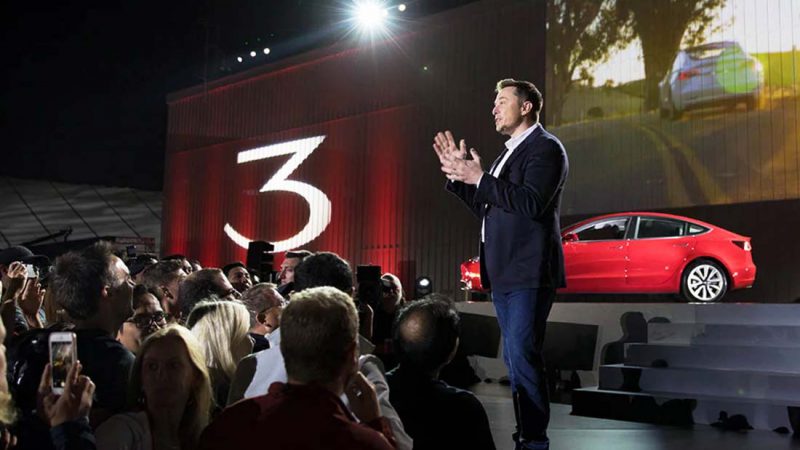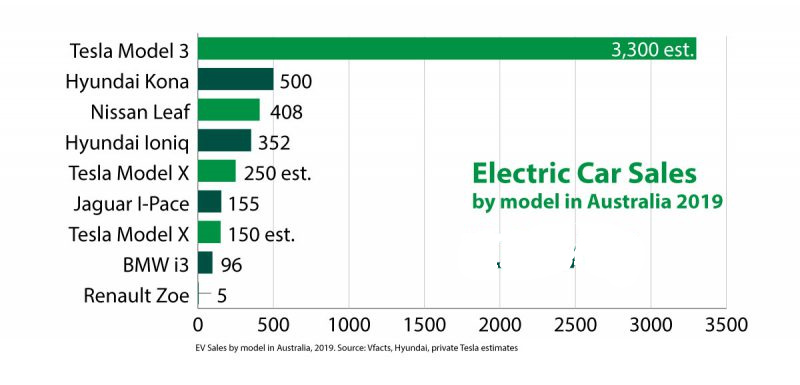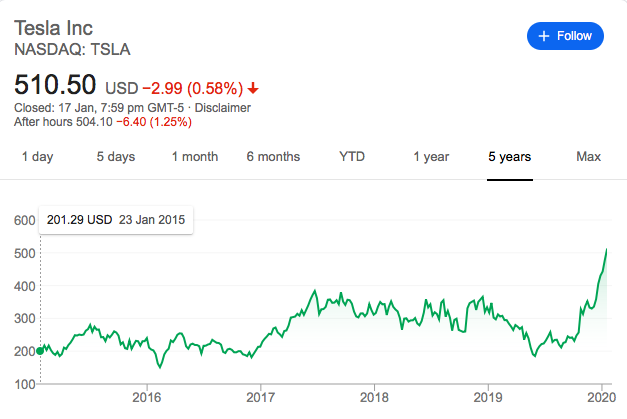California car-maker Tesla has taken the lion’s share of the electric vehicle market in Australia, with the recently released Model 3 sedan taking a dominant position in the market – as it has in nearly every other market.

Official data and private estimates suggest that in 2019, the sales of new pure electric cars in Australia reached around 5,000 vehicles, or about 0.5 per cent of the total new car market.
Tesla accounted for around 70 per cent of these sales, possibly more, and the Model 3 accounted for around two-thirds of annual electric sales, even though first deliveries of that model only occurred in late August.
The Model 3 even seized a major share of the overall market for passenger vehicles prices above $60,000, likely beating the BMW 3 (3,135 sales), and coming in second to the Mercedes Benz C-Class (6,798).
Actual numbers are difficult to obtain because Tesla does not release country by country sales, and – unlike most other countries – official Australian data for EVs is incomplete or haphazard at best.
V-Facts compiles detailed numbers for all vehicles with the exception of Tesla, which does not operate through conventional dealerships. The numbers in the graph below are supplemented by official numbers from Hyundai, and private estimates from Tesla.

These estimates for Tesla are described by insiders as “in the ball-park” and possibly a little high, but Tesla has no interest in confirming numbers even if they were spot on.
Data compiled from registries, such as NSW as far as September, suggest that a number north of 3,000 is almost certain for the Model 3, given that 1,400 for the September quarter are confirmed by registry data. And total Tesla numbers that include the Model S and Model X are likely between 3,300 and 3,700.
The sales of electric, along with plug-in hybrid and hybrid vehicles were the only bright spots in a particularly bleak year for new car sales in Australia. Overall sales plunged 7.8 per cent to their lowest level since 2011, and passenger car sales were particularly badly affected with a fall of 16.2 per cent.
Plug-in hybrid sales in 2019 were boosted by a growing interest in the Mitsubishi Outlander (which nearly doubled sales to around 700, and in the plug-in version of the Hyundai Ioniq (123). Pure hybrid sales soared, driven mostly by Toyota models such as the Corolla (10,597), Camry (8,696) and RAV4 (7,411).
Anecdotal evidence, and consumer surveys, suggest many potential car buyers are holding off and running their current vehicles longer as they wait for an EV model that suits their needs and their budget.
Model offerings are limited, with only around six on offer in Australia in 2019, and about a dozen in 2020. This compares to more than 150 in Europe and elsewhere.
Australia still trails the world in the uptake of EVs. Its plug-in market (pure electric and plug-in hybrid) is about 0.6 per cent of the total market, compared to Norway where it is 56 per cent, Iceland 25 per cent, the Netherlands 15 per cent, Sweden 11 per cent. Even in Portugal 5.5 and Switzerland 5.7 per cent it is nearly 10 times the share of Australia.
The dominance of Tesla in the Australian market is being repeated elsewhere. According to Cleantechnica, In Norway and the Netherlands, the Model 3 was the best selling automobile of any kind in any class in 2019.
In New Zealand, Tesla sold 801 new pure electrics (including 656 Model 3s) out of a total market of 1,864 new pure electric vehicles sold in 2019, nearly doubling its total sales to date to 3,766. New Zealand also has a thriving used car market for electric and hybrids, with 3,290 second-hand Nissan Leafs imported from Japan in 2019.

Tesla is due to release its latest quarterly results on Thursday week, which will be watched closely given the recent surge in the company’s share price to north of $US500/a share, giving it a market capitalisation close to $US100 billion.
The market will also be looking for news on the imminent production of the Model Y, and the latest on plans for the Tesla semi (the fully electric truck), the Tesla ute (now known as the Cybertruck), and full self driving, along with new delivery forecasts for 2020.